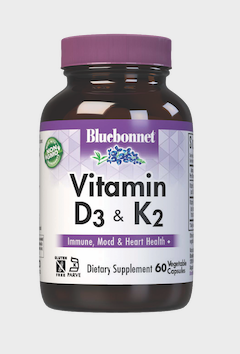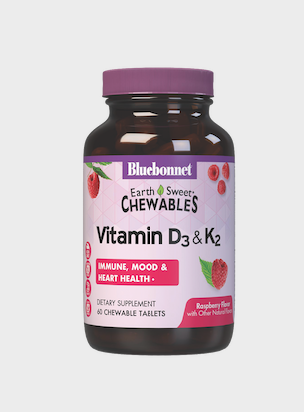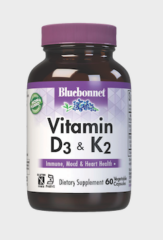Q1. What is the synergy between vitamins D3 & K2, and why is it important?
Vitamin D3 and K2 are best together for good health. Research is discovering that this powerful combination works synergistically to help support bone and heart health, but some benefits, like immune health and mood support, go beyond these applications. Vitamins D3 and K2 are fat-soluble nutrients that play critical roles in calcium metabolism, and while their roles are different, they overlap. Vitamin D3 is best known for helping the body absorb calcium – a mineral required for muscle function, nerve transmission, vascular contraction, and vasodilation, along with intracellular hormonal secretion and the resorption and deposition of bone. Vitamin K2 also plays a role in the regulation of bone metabolism because the utilization of calcium relies on the synthesis of vitamin K-dependent proteins. Without this dynamic duo, calcium would not be adequately utilized for healthy bones and teeth.

Q2. What newfound roles do vitamin D3 & K2 play in supporting immune health?
The benefits of this nutrient pair are no longer in the shadows, and the research community is finally investigating the new roles and benefits of their synergic interplay. For instance, in the last two and a half years, clinical research has highlighted the important synergistic relationship between these two vitamins for immune health. Studies have documented the correlation between these two nutrients’ low and/or deficient status and the risk for severe COVID-19 infection. In fact, low vitamin D and K status were found to predict mortality in patients with COVID-19. This is because the pathology of COVID-19 infection stems from an overactive inflammatory response with interleukin (IL6), a key cytokine. The literature suggests that vitamins D3 and K2 are modulators of this process, down regulating this powerful cytokine for better health outcomes.
Further, it has also been noted that while many individuals have increased their vitamin D intakes, vitamin K intakes have remained the same. When you increase vitamin D intake, the body’s demand for vitamin K also increases. Remember, vitamins D3 and K2 work together to regulate calcium metabolism properly, so they are intimately linked in their structure/function applications in the body. Without the proper balance of these two nutrients, calcium can be deposited in soft tissues, like arteries or lungs, instead of in the bones, where it needs to be. These new findings have also spurred scientists to investigate the connection between vitamin K levels, lung injury, and thromboembolism in COVID-19 patients.
Q3. What fresh perspectives have been identified for their role in supporting mood?
Both nutrients, vitamin D3 & vitamin K2, are needed for their actions with the nervous system for mood balance. Vitamin D3 deficiency is linked to depression due to the body’s inability to synthesize serotonin from tryptophan, which is enzyme-dependent on vitamin D. Vitamin K2 has been known to be required for sphingolipid metabolism, which is important for the maintenance of physiological functions of the brain. Vitamin K2 is also believed to perpetuate its mood-boosting effects by helping to support healthy glucose levels in the brain. Because vitamins D and K have a synergistic relationship, if vitamin D levels increase protein concentrations of vitamin K-dependent proteins, then taking high levels of vitamin D supplementation without supporting vitamin K levels through diet or supplementation could lead to an excess of these proteins without sufficient vitamin K to work. This could lead to dysfunction in proteins that play a key role in inhibiting many other functions related to brain health and mood.
Q4. What products should consumers look to for higher vitamin K intakes?
Because these two nutrients work better together, there is a need for a balanced intake of this perfect pair to maintain strong, healthy bones, support heart and immune health, and enhance mood. Since vitamins D3 and K2 have this synergistic interplay, it is recommended that if vitamin D levels are low and you begin a supplementation regimen, you may also want to increase vitamin K intake, either by foods or supplements, especially if calcium is included in the formulation. That is why the nutritional scientists at Bluebonnet have worked to marry these two nutrients in multiple formulas across its brand of supplements. For instance, their entire Whole-Food Based Line of ONE® Multiples incorporates both of these nutrients at the dosages recommended by science for general health and wellbeing. For those looking to increase low or deficient levels of these two important nutrients, Bluebonnet now offers Vitamin D3 & K2 Vegetable Capsules and EarthSweet® Chewable Vitamin D3 & K2 Tablets with 125 mcg (5000 IU) of vitamin D3 from lanolin and 100 mcg of vitamin K2 from natto, per serving.

*These statements have not been evaluated by the Food and Drug Administration.These products are not intended to diagnose, treat, cure or prevent any disease.
This content paid for and provided by Bluebonnet Nutrition.










